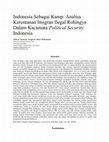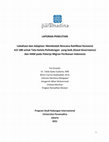Papers by Johnson Montana Mangapul

BEBESEA Research Report, 2024
This report examines the complex challenges faced by Southeast Asian migrant fishery workers thro... more This report examines the complex challenges faced by Southeast Asian migrant fishery workers throughout their migration journey. Prior to employment, Indonesian workers, for instance, are often enticed by promises of higher wages on foreign vessels but these offers frequently conceal additional costs and harsh working conditions, leading to debt and exploitation exacerbated by language barriers and unclear contracts.
The pre-departure phase often involves debt bondage, with recruitment fees reaching as high as US$1,289 in Indonesia, compounded by opaque credit systems. Furthermore, the complexity of employment contracts and varied visa regulations in destination countries, like Taiwan, create a precarious legal environment.
Upon arrival at their assigned vessels, migrant workers face isolation, exploitation, and limited communication due to the retention of their documents by ship captains or agencies. Lack of access to adequate healthcare and insurance further jeopardizes their well-being, and the absence of union representation denies them collective bargaining power.
Post-return challenges include unpaid wages, exacerbating financial
vulnerabilities, and the often self-financed repatriation process hinders
reintegration into their home countries. These multifaceted challenges
underscore the need for comprehensive strategic interventions to ensure
adequate protection and support for migrant fishery workers.

This thesis aims to analyze the extent of identity resistance carried out by Rohingya refugees in... more This thesis aims to analyze the extent of identity resistance carried out by Rohingya refugees in the Rohingya Refugee Repatriation between Myanmar and Bangladesh in 2017-2019. This re-tracking is used to understand how the identity of Rohingya refugees is also formed at each phase of the formation of the subject, especially in the first repatriation policy where the articulation of refugee identity is; for the first time embedded. Through retracing as well, the formation of this subject also shows how the stability of the articulation of refugee identities can be stabilized due to structural discrimination patterns. After understanding the stability of the articulation of identity, this research continues with how and to what extent the Rohingya refugees resisted the articulation of the identity embedded by them from the first repatriation policy era to the 2017 repatriation policy. By using the poststructuralism paradigm, as well as post-structuralism discourse analysis by Lene Hansen and the subject Julia Kristeva's politics, this study tries to genealogically analyze the emerging discourse which also reflects the relationship between Myanmar's (semiotic) past self and Rohingya refugees who form symbolic selves with each other. The results of this study indicate that there is no change in the articulation of identity nor any significant dissenting discourses emerged from the Government of Myanmar to Rohingya refugees throughout the repatriation policy episodes from 1978 to 2017, so that the repatriation policy is only intended to accommodate international criticism, not to answer the refugee problems. Other results also show that there is a change in the pattern of resistance from Rohingya refugees in the form of diplomacy, rebellion and political negotiations to memories and artistic expressions that are only possible in accordance with the strengthening of the vulnerability of Rohingya refugees in the history of repatriation.

Penelitian ini bertujuan untuk menganalisis sejauh mana resistensi identitas yang dilakukan pengu... more Penelitian ini bertujuan untuk menganalisis sejauh mana resistensi identitas yang dilakukan pengungsi Rohingya pada kebijakan Repatriasi Pengungsi Rohingya antar Myanmar dan Bangladesh pada tahun 2017. Penelitian ini dimulai dengan melacak ulang konstruksi sang ‘subyek’ yaitu Myanmar dari jaman awal kemerdekaan, hingga kebijakan repatriasi 1978, sampai Myanmar kontemporer yang ditandai dengan jatuhnya pemerintahan Junta dan digantikan oleh pemerintah quasi demokratis. Pelacakan ulang ini digunakan untuk memahami bagaimana identitas pengungsi Rohingya turut terbentuk pada setiap fase pembentukan sang subyek, terlebih pada kebijakan repatriasi pertama yang di mana artikulasi identitas pengungsi untuk pertama kali tersematkan. Lewat pelacakan ulang juga, pembentukan sang subyek ini turut menunjukkan bagaimana kestabilan artikulasi identitas pengungsi dapat distabilkan karena adanya pola diskriminasi struktural. Setelah mendapatkan kestabilan artikulasi identitas, penelitian ini dilanjutkan dengan bagaimana dan sejauh mana pengungsi Rohingya melawan artikulasi identitas yang disematkan olehnya dari era kebijakan repatriasi pertama sampai dengan kebijakan repatriasi 2017. Dengan menggunakan paradigma pasca-strukturalisme, serta analisis diskursus pasca-strukturalisme Lene Hansen dan subyek politik Julia Kristeva, penelitian ini mencoba untuk menganalisis secara genealogis diskursus yang muncul yang juga merefleksikan adanya keterkaitan antara diri masa lalu (semiotik) Myanmar dan Pengungsi Rohingya yang saling membentuk diri simbolik satu sama lain. Hasil penelitian ini menunjukkan bahwa tidak ada perubahan artikulasi identitas dari Pemerintah Myanmar kepada Pengungsi Rohingya di sepanjang episode-episode kebijakan repatriasi 1978 sampai 2017, sehingga kebijakan repatriasi hanya ditujukan untuk mengakomodasi kecaman-kecaman internasional, bukan untuk menjawab permasalahan pengungsi. Hasil lain juga menunjukkan bahwa adanya perubahan pola resistensi dari pengungsi Rohingya berupa diplomasi, pemberontakan dan negosiasi politik sampai kenangan dan ekspresi seni yang hanya mungkin dilakukan seturut dengan menguatnya kerentanan pengungsi Rohingya dalam sejarah repatriasi.

Pertemuan Nasional Mahasiswa Hubungan Internasional Indonesia Ke-31, 2019
Abstraksi Etnis Rohingya yang telah dipersekusi oleh pemerintah Myanmar mengakibatkan adanya gelo... more Abstraksi Etnis Rohingya yang telah dipersekusi oleh pemerintah Myanmar mengakibatkan adanya gelombang pengungsi yang masif sejak tahun 2009 di Indonesia. Para imigran ilegal Rohingya yang harus meninggalkan wilayah teritorial Myanmar tersebut terpapar kondisi tercerabutnya bios (hidup-politik) dari zoe (hidup-alamiah) dan masuk kedalam fase bare-life (kehidupan-telanjang) dalam paradigma biopolitik dari Giorgio Agamben. Kehidupan-telanjang tersebut merupakan dampak dari pencabutan kewarganegaraan yang dilakukan oleh pemerintah Myanmar terhadap etnis Rohingya melalui pemberlakuan Konstitusi Baru Burma yang menghasilkan state of exception atau keadaan pengecualian yang berupa Hukum Kewarganegaraan Burma tanpa menciptakan ruang bagi etnis Rohingya untuk memenuhi prasyarat sebagai warga negara Myanmar. Kondisi pencabutan hak kewarganegaraan tersebut berujung pada tersematnya status stateless pada setiap individu etnis Rohingya dan tereduksinya etnis Rohingya sebagai the other. Dalam kondisi stateless tersebut, para pengungsi Rohingya mengalami kerentanan terhadap setiap aspek kehidupan mereka. Dengan hilangnya hak atas kewarganegaraan, hilang juga hak-hak politik yang merupakan prasyarat terbentuknya kehidupan yang lebih baik. Kondisi tersebut memaksa para pengungsi Rohingya untuk mencari negara yang mampu memberikan pemenuhan atas aspek kehidupan politik mereka. Akan tetapi, Indonesia yang tidak meratifikasi Konvensi 1951 dan Protokol 1967 tidak mampu memberikan harapan akan adanya kesempatan untuk mendapatkan political power karena ketiadaan status selain penyematan status yang tergantung pada artikulasi publik. Hal tersebut menimbulkan berbagai macam problematika tersendiri bagi para imigran ilegal Rohingya maupun bagi masyarakat Indonesia. Disisi lain, kurangnya diskursus mengenai "siapa" Rohingya dan "apa" yang terjadi pada mereka melahirkan potensi atas persepsi publik masyarakat Indonesia yang beragam. Penulis menemukan banyak sekali analisa yang mencoba untuk menyelesaikan kasus imigran illegal Rohingya dari pendekatan regional dan internasional, baik dalam kajian politik, keamanan dan hukum, sampai penyelesaian masalah dengan seruan moral atau menggebrak ASEAN dengan mitos 'non-intervensi'nya. Namun penulis belum menemukan adanya karya ilmiah di dalam negeri yang memberikan perhatian pada kerentanan politik stateless dan implikasinya. Untuk itu Penelitian ini akan dimulai dengan menguak proses dehumanisasi, denasionalisasi dan depolitisasi terhadap Etnis Rohingya yang awalnya sebagai entitas politik dengan daya 'kausal' menjadi hidup-telanjang (nir-politik), lalu dengan berargumen bahwa tidak ada ruang yang tidak terpapar dengan politik, maka entitas nir-politik akan selalu terpapar 'daya kausal' dari entitas-entitas politik lainnya. Akhirnya penelitian ini ditutup dengan rekomendasi kebijakan bagi pemerintah dan seruan moral bagi rakyat karena rasa cemas lewat pembiaran dan pesimisme terhadap keberadaan mereka sama saja dengan menciptakan kecemasan itu sendiri yang mengancam keamanan Indonesia.
Drafts by Johnson Montana Mangapul

Dengan menggunakan konsep Acharya tentang difusi dan lokalisasi norma, penelitian ini menggali re... more Dengan menggunakan konsep Acharya tentang difusi dan lokalisasi norma, penelitian ini menggali rencana pemerintah Indonesia untuk meratifikasi konvensi Organisasi Buruh Internasional (ILO) 188 (KILO 188) tentang perlindungan anak buah kapal (ABK) perikanan. Penelitian ini berpendapat bahwa pemerintah Indonesia cenderung melokalisasi KILO 188 ke dalam peraturan nasional berdasarkan pertimbangan domestik, dari pada langsung meratifikasi konvensi. Dengan menggunakan wawancara mendalam dan metode FGD, penelitian ini menghasilkan dua temuan. Pertama, untuk membingkai urgensi ratifikasi, penelitian menemukan bahwa aktor negara dan aktor non-negara menggunakan isu pelanggaran HAM Anak Buah Kapal (ABK) migran perikanan Indonesia dan kurangnya tata kelola regulasi untuk melindungi ABK migran. Kedua, kecenderungan pemerintah Indonesia untuk mencangkok dan melokalisasi konvensi didorong oleh kepentingan untuk melegitimasi
tindakan politik mereka di dalam negeri dan untuk menghindari tanggung jawab langsung sebagai anggota dari KILO 188.
Books by Johnson Montana Mangapul

Roadmap Recommendations, 2023
In June 2007, the International Labour Organization (ILO) created the Work in Fishing Convention ... more In June 2007, the International Labour Organization (ILO) created the Work in Fishing Convention (No. 188). The ILO C-188 was aimed at ensuring decent working conditions for fishers aboard fishing vessels, specifically with regard to conditions of service, accommodation and food, occupational safety and health (OSH) protection. The convention was made to fill the absence of labour protections in the fisheries sector,
which is excluded from the Maritime Labour Convention of (MLC) 2006. It requires countries that ratify it to adopt policies that ensure commercial fishers are not tainted with the practices of forced labour, trafficking in persons and modern slavery. The convention highlights some keywords such as social security, fisher’s work agreement, humane working conditions, access to fair settlement on disputes in connection with a fisher's work agreement, and labour inspections to ensure the aforementioned factors.This ‘Roadmap Recommendations for the Ratification of ILO Convention 188’ is made to map out and provide input
to policy makers in Indonesia regarding the extent to which existing rules, practices, and regulations are in accordance with protection norms in the C-188. This document contains analyses of conformity with existing regulations, stakeholders’ opinions on the implementation of the existing regulations, and nine points of recommendations.









Uploads
Papers by Johnson Montana Mangapul
The pre-departure phase often involves debt bondage, with recruitment fees reaching as high as US$1,289 in Indonesia, compounded by opaque credit systems. Furthermore, the complexity of employment contracts and varied visa regulations in destination countries, like Taiwan, create a precarious legal environment.
Upon arrival at their assigned vessels, migrant workers face isolation, exploitation, and limited communication due to the retention of their documents by ship captains or agencies. Lack of access to adequate healthcare and insurance further jeopardizes their well-being, and the absence of union representation denies them collective bargaining power.
Post-return challenges include unpaid wages, exacerbating financial
vulnerabilities, and the often self-financed repatriation process hinders
reintegration into their home countries. These multifaceted challenges
underscore the need for comprehensive strategic interventions to ensure
adequate protection and support for migrant fishery workers.
Drafts by Johnson Montana Mangapul
tindakan politik mereka di dalam negeri dan untuk menghindari tanggung jawab langsung sebagai anggota dari KILO 188.
Books by Johnson Montana Mangapul
which is excluded from the Maritime Labour Convention of (MLC) 2006. It requires countries that ratify it to adopt policies that ensure commercial fishers are not tainted with the practices of forced labour, trafficking in persons and modern slavery. The convention highlights some keywords such as social security, fisher’s work agreement, humane working conditions, access to fair settlement on disputes in connection with a fisher's work agreement, and labour inspections to ensure the aforementioned factors.This ‘Roadmap Recommendations for the Ratification of ILO Convention 188’ is made to map out and provide input
to policy makers in Indonesia regarding the extent to which existing rules, practices, and regulations are in accordance with protection norms in the C-188. This document contains analyses of conformity with existing regulations, stakeholders’ opinions on the implementation of the existing regulations, and nine points of recommendations.
The pre-departure phase often involves debt bondage, with recruitment fees reaching as high as US$1,289 in Indonesia, compounded by opaque credit systems. Furthermore, the complexity of employment contracts and varied visa regulations in destination countries, like Taiwan, create a precarious legal environment.
Upon arrival at their assigned vessels, migrant workers face isolation, exploitation, and limited communication due to the retention of their documents by ship captains or agencies. Lack of access to adequate healthcare and insurance further jeopardizes their well-being, and the absence of union representation denies them collective bargaining power.
Post-return challenges include unpaid wages, exacerbating financial
vulnerabilities, and the often self-financed repatriation process hinders
reintegration into their home countries. These multifaceted challenges
underscore the need for comprehensive strategic interventions to ensure
adequate protection and support for migrant fishery workers.
tindakan politik mereka di dalam negeri dan untuk menghindari tanggung jawab langsung sebagai anggota dari KILO 188.
which is excluded from the Maritime Labour Convention of (MLC) 2006. It requires countries that ratify it to adopt policies that ensure commercial fishers are not tainted with the practices of forced labour, trafficking in persons and modern slavery. The convention highlights some keywords such as social security, fisher’s work agreement, humane working conditions, access to fair settlement on disputes in connection with a fisher's work agreement, and labour inspections to ensure the aforementioned factors.This ‘Roadmap Recommendations for the Ratification of ILO Convention 188’ is made to map out and provide input
to policy makers in Indonesia regarding the extent to which existing rules, practices, and regulations are in accordance with protection norms in the C-188. This document contains analyses of conformity with existing regulations, stakeholders’ opinions on the implementation of the existing regulations, and nine points of recommendations.